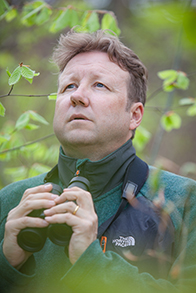I am Chair of the IUCN Species Survival Commission Species Monitoring Specialist Group (https://www.speciesmonitoring.org/) which aims to enhance biodiversity conservation by improving the availability and use of data on species populations, their habitats and threats. The Group implements projects that deliver on five objectives relating to monitoring tools and methods, capacity building, data collection and use, databases, and poorly known taxa. My collaboration with the Laboratory for Conservation Biology in the Fumagalli Group aims to develop and implement research to enhance the science behind biodiversity monitoring.
My research interests include:
- Understanding the challenges and costs of biodiversity monitoring and the taxonomic and geographic biases in data and capacity.
- Developing and testing indicators, tools and guidelines to enhance biodiversity monitoring in different environments for different stakeholders, especially for threatened species projects, protected areas and businesses.
- Testing and comparing technological solutions for biodiversity monitoring, especially remote sensing (e.g., cameras, acoustic recording devices) and eDNA.
- Exploring the scientific principles behind effective biodiversity monitoring (e.g., indigenous range, ecological function).
- Understanding the factors affecting success and impact in conservation programmes.
- Filling data gaps for poorly known species (e.g., small mammals, invertebrates, plants, fungi).
Although the geographic and taxonomic scope of my work is broad, I tend to focus on my long-term interests: Africa/Madagascar and mammals.
Recent collaborative research projects include the following.
Towards a nature-positive, actionable and measurable framework for voluntary biodiversity credits(2024-2025)
As part of this project, we are investigating the data, indicators and methods used to define credits and to ensure monitoring, reporting and verification, and assessing what needs to improve to create a credible market (if it is feasible).
Main partners: University of Lausanne, IMD - International Institute for Management Development, Biodiversity Credit Alliance.
Main donor: Enterprise for Society Centre - E4S
More information: https://e4s.center/resources/reports/towards-a-nature-positive-actionable-and-measurable-framework-for-voluntary-biodiversity-credits/
Unblocking the flow of biodiversity data for multi-stakeholder environmental sustainability (2021-2023)
This project brought together experts from conservation biology and business sustainability management to explore biodiversity data user needs across sectors and to identify the reasons behind blockages to data flow and access.
Main partners: University of Lausanne, University of St Gallen, University of Ghana, Humboldt Biological Resources Research Institute, Colombia.
Main donor: Swiss Network for International Studies - SNIS.
More information: https://snis.ch/projects/unblocking-the-flow-of-biodiversity-data-for-multi-stakeholder-environmental-sustainability-management/
Developing and disseminating guidelines and tools on biodiversity monitoring (2023-2025)
This project aims to develop and disseminate guidelines and tools on biodiversity monitoring to a diversity of stakeholders to improve data use in conservation. It includes a horizon scan of research priorities for monitoring, reviews of monitoring methods, tools and technologies, and an update to the specialist group’s Database of Global Data Sources for Biodiversity Conservation Monitoring.
Main partners: University of Lausanne, IUCN, IUCN Species Survival Commission.
Main donor: IUCN Species Survival Commission.
For information and updates on these projects and others, see https://www.speciesmonitoring.org/projects.html.
UNIL Masters projects supervised:
- Irina Casimiro - Factors influencing the effectiveness of monitoring in Swiss protected areas conserving natural values” (2023-2025).
- Clara Fraschini - Comparing species monitoring methods: a case study in South Africa (2022-2024).
- Inès Moreno - Data gaps and biases for threatened species in East Africa and the implications for biodiversity conservation (2020-2021).
PJ has been involved in species research and conservation for over 30 years.
After gaining a BSc in Zoology from the University of London, he studied for his PhD at the University of Aberdeen, investigating the ecology and reproductive energetics of tenrecs (Mammalia: Afrotheria: Tenrecidae) in Madagascar. He went on to work for Scottish Natural Heritage in the Cairngorms, WWF in the Democratic Republic of Congo and Tanzania, and Conservation International in Côte d'Ivoire.
PJ moved to Switzerland in 2000 to work for WWF International. After establishing and managing elephant, great ape and rhino programmes for the Africa & Madagascar Programme, he went on to become Director of Conservation Strategy & Performance. In this role, between 2007 and 2016, he drove results-based management across the WWF network, introducing monitoring systems that measured delivery of priority programmes and global goals for the first time in the organization's history. He was recently Senior Advisor, Monitoring, in IUCN's Science & Knowledge team in Gland and a Senior Research Fellow at ETH Zürich. As well as heading up the Species Monitoring Specialist Group, he is a member of the IUCN SSC specialist groups for Primates and Afrotheria, and the IUCN World Commission on Protected Areas.

